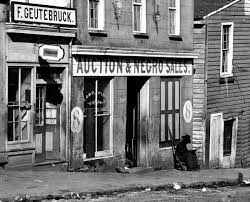
via Wikipedia
75 Wall Street – New York City
This extravagant 42-story apartment tower oozes luxury. But in the mid-1600s? It was the site of New York’s major slave market.
For 150 years, what is now 75 Wall Street was the state’s premiere location for auctioning off abducted Africans. Now, only an obscure plaque recognizes the thousands of lives sold off here like cattle.
Virginia Union University – Richmond, VA
Robert Lumpkin was a cruel man, known for his rampant violence against enslaved Blacks. Once he purchased a slave holding facility in Shockoe Bottom - Richmond’s downtown infamously known for selling about 350,000 captives from 1850 to 1865 - Lumpkin’s Jail quickly acquired the name “The Devil’s Half Acre.”
Today, a historically black seminary, Virginia Union University, sits in place of the former jail and slave markets. No remnants exist of the cruelty that once persisted.
Forks of The Road – Natchez, MS
Mississippi’s plantation society was strong, and Natchez’s slave market acted as an important site to fill the bountiful cotton plantations littered throughout the state. Situated at a busy intersection, “Forks of the Road” could see up to 500 slaves sold and bargained for per day.
Today, that intersection is a ghost town, where an abandoned parking lot and bar sit alongside a marker of this history.
Old Slave Mart Museum – Charleston, SC
For two centuries, the slave trade fueled Charleston’s economic success. And the Old Slave Mart was the go-to place to auction captured Africans.
In 2007, the mart was reopened by the city as the Old Slave Mart Museum, where this history is remembered.
The Rice Museum – Georgetown, SC
Near South Carolina’s coast existed a slave market, The Old Market Building, that imported abducted Gambians, Angolans, and Senegalese people. These groups were specifically targeted for their rice growing skills, and worked in American rice fields once sold.
Today, in place of the slave market and jail stands The Rice Museum, acknowledging slavery’s contribution to the city’s economic prosperity - a history that many other cities have erased.